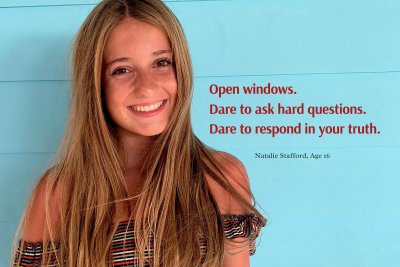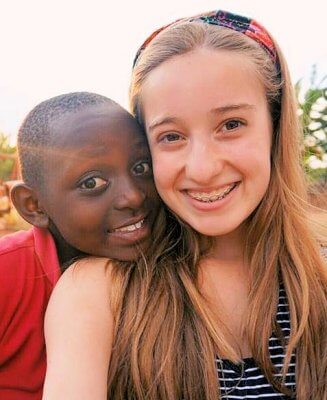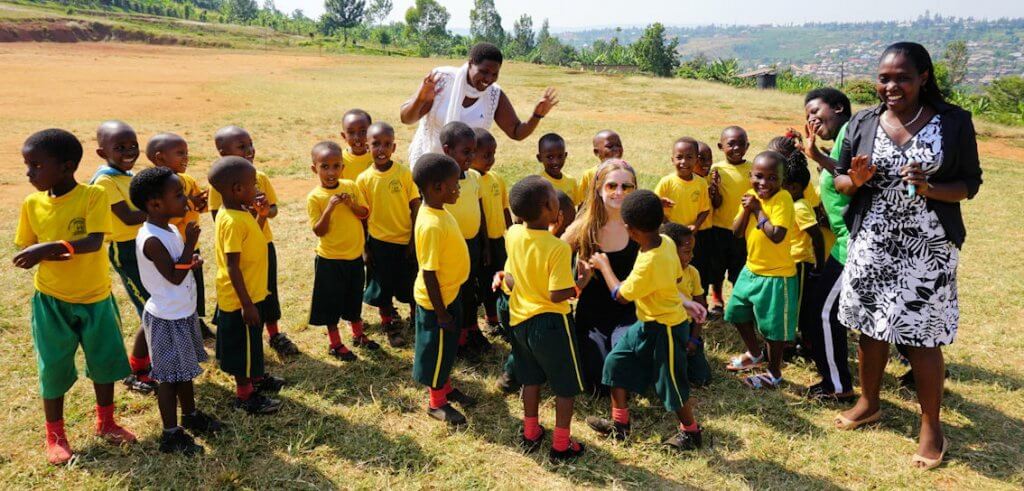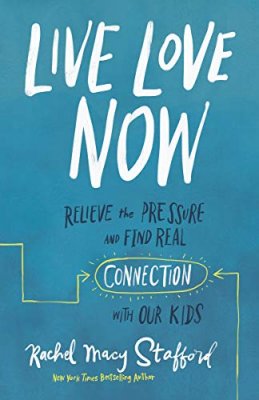
Live Love Now: Relieve the Pressure and Find Real Connection with Our Kids is a captivating new book by New York Times best-selling author, Rachel Macy Stafford.
Beautifully written, it shares inspiring stories, strategies that value people’s own experiences, and ways to apply new concepts to the shifting challenges of raising and educating children in a high-pressured world.
Through raw truth-telling and authentic encouragement, Live Love Now echoes the research in child and adolescent development—that successful kids are not driven by external accomplishments alone. Children must discover for themselves what they love and don’t love to do. Of course, learning academics is an important part of children’s growth and development. But Rachel Macy Stafford emphasizes that kids need to explore how their unique strengths, abilities, and interests help them fit into society and find meaning in life.
The stories Stafford shares of raising children and tackling the struggles of being a mother are not unlike those faced by all adults who are engaged with raising and educating kids. What Stafford does differently in Live Love Now is to remain open to her own imperfections and vulnerabilities—to be okay when life doesn’t always feel okay. In the process, Stafford invites others, including her children, to open themselves to their own truths. Research shows this is one of the most meaningful gifts children receive from caregivers—the encouragement to open windows to their own self-awareness and inner strengths.
In Live Love Now, Stafford reflects on how she views her children: “Your achievements are only a sliver of who you are. If I focus solely on the sliver, I miss the highlights. I miss the big picture.”
A Special Excerpt from Live Love Now
With permission from the publisher, I am pleased to share a beautiful poem and essay from Live Love Now that was written by Stafford’s daughter Natalie, now 16. Natalie’s words are poignant reminders of the “big picture”—most often bigger than a parent’s mind could ever imagine.
One Window
One window is all I need,
To see what our world could become,
To know that we mustn’t turn away,
To understand the pain of feeling invisible.
One window is all I need,
To experience real love,
To realize that everyone has insecurities.
To know that life will have hardships.
One window is all I need,
To find true friends,
To appreciate what I have.
One window is all I need to follow my heart,
To support others,
To notice the good in everyone.
One window is all I need
To love as I have been loved.
—Natalie Stafford
I was around four years old when I started asking my mom for Talk Time. It was more like Question Time, because I always asked her to tell me something bad that had happened in the world that day. Somehow, I knew life was not always like the happy stories I read in picture books and saw in Disney movies.
My mom told me about the suffering in the world in ways I could understand. I am grateful she did this. Pretending suffering doesn’t exist or ignoring it does not make it go away—it intensifies it. Knowing and understanding perspectives, cultures, and circumstances outside our own opens a window that calls us to seek answers to the most important questions of life.
At a very young age, my mom opened a window for me. I wanted to respond to it all with a loving heart and a desire to learn.
 At age fourteen, that window opened wider than I could have imagined through a Learning Trip with a nonprofit organization called African Road whose mission is to use the richness of friendships to make way for sustainable growth led by local leaders and their communities in East Africa. Although I didn’t tell anyone until months after the trip concluded, I’d actually been terrified to go to another continent. My biggest fear was that I would get sick. But I felt certain that if I faced this fear and made the trip, it would give me the confidence to overcome future obstacles.
At age fourteen, that window opened wider than I could have imagined through a Learning Trip with a nonprofit organization called African Road whose mission is to use the richness of friendships to make way for sustainable growth led by local leaders and their communities in East Africa. Although I didn’t tell anyone until months after the trip concluded, I’d actually been terrified to go to another continent. My biggest fear was that I would get sick. But I felt certain that if I faced this fear and made the trip, it would give me the confidence to overcome future obstacles.
The moment I stepped off the bus in Gasogi, Rwanda, my fears immediately subsided; I was overcome with inexplicable peace. The Togetherness community, formed by Pastor Steven Turikunkiko in response to the cries of the children orphaned in the 1994 Rwandan Genocide, is now a community of 142 young adults and children. These young people have developed a community where healing, empowerment, and skill building happen on the soccer field, in the bakery, in the preschool, at the water well, and on the farm.
Each day I was greeted by the children’s wide smiles and welcoming waves. One of my special young friends, Emmanuel, would walk right up to me, grab my hand, and lead me to a shady spot that overlooked the dirt soccer field, where we were joined by other children to draw, laugh, and just enjoy being together.
Although I replay many experiences from the Learning Trip in my mind, there is one moment that stands out from the rest. One morning, my mom and I were invited to play games with the preschool children. The teachers asked us to lead the Hokey Pokey. Because I am one who normally shies away from the limelight and does not feel comfortable singing or dancing in front of people, my response to their invitation shocked me. I actually hopped right up to join in. I looked at all the little faces around me and couldn’t help but smile. As I spun around in circles and sang out loudly, the kids looked up at me and smiled and giggled. I became lost in that moment.
I’m quite certain I never knew pure and complete joy until that experience.
What created it? I believe it required stepping outside my comfort zone with a completely open heart that allowed me to connect in the most pure and loving way. From that moment, a recurring question that had been in my mind changed from, What do I want to do with my life? to, How is life calling me to hop up and participate with my whole being?
Although this enlightening experience didn’t directly change anything back home, the suspicion that had been forming in my mind for a few years, maybe as far back as when I was four, was confirmed; it was clear to me that I would find life’s most important questions and answers outside familiar territories and beyond my school walls.
I often wonder how things might change if, instead of being backed into corners with questions like, “Why didn’t you do your assignment?” young people were given more opportunities to explore bigger questions.
Have you ever felt true joy?
Have you ever stood under a vast sky and felt small?
Have you ever held hands with a stranger who instantly felt like family?
Instead of pressure to answer questions like, “Do you have enough activities to build your resume?” we were challenged to answer bigger questions?
Have you ever stood at a scenic lookout as long as your heart desired?
Have you ever looked fear in the face and said, “You can’t stop me”?
Have you ever been so lost in a moment that every worry on your mind was lifted?
I call questions like these Window Questions because they make me look at the world differently. They reveal how intelligence and wisdom are acquired through real-life experiences and relationships, as opposed to temporary retention of information for test-taking and busywork. Window Questions lead young people to think about how they can experience life’s deepest joys.
Whenever I encounter a situation that causes me to doubt my capability or my worth, I open the journal I wrote in before and during my trip to Rwanda. These pages, now lined with red dirt, sweat, and a few tears, hold the beginnings of my purpose-discovery process. I know the details will fade, and I know I can’t yet grasp the whole big picture of my life, but I look at things through a new window
If I could give the world one message, it would be this: Open windows. Dare to ask hard questions. Dare to respond in your truth. Dare to step out in courage. Dare to reach farther than you ever thought you could. Because the reality is, our best ideas and our bravest solutions to the world’s big questions won’t have a chance to surface if they’re stifled by our worries, fears, expectations, or agendas.
We simply cannot afford to let world-changing contributions become buried under a stack of things society says we “should do,” suffocated by worry about failing before we even try or shut down by a standardized metric such as a poor letter grade. I would argue these outcomes are not failure of a human being but rather failure to open a window. One window could inspire even the most unlikely souls to hop up, put their whole selves in, and shake the world with hope.
Raising and Educating Kids Who Know Their Inner Strengths
 Natalie Stafford’s experiences in Africa when she was 14 were like many of the young people interviewed for my research on youth civic engagement. Their stories, part of my book Tomorrow’s Change Makers: Reclaiming the Power of Citizenship for a New Generation, are tales of transformation. Young people’s service experiences opened new windows of understanding of themselves and others.
Natalie Stafford’s experiences in Africa when she was 14 were like many of the young people interviewed for my research on youth civic engagement. Their stories, part of my book Tomorrow’s Change Makers: Reclaiming the Power of Citizenship for a New Generation, are tales of transformation. Young people’s service experiences opened new windows of understanding of themselves and others.
Additionally, an important aspect of my research was to study the life stories of these young people, not just their life-changing service experiences. I discovered five steps in their transformative learning process. Most importantly, children who have these kinds of transformative life experiences have been nurtured and supported by parents and teachers that follow the examples offered in Stafford’s book Live Love Now. These adults focus on fostering children’s inner strengths, the core abilities that help kid’s thrive in school and life.
Perhaps the question, “What does it mean to “live love now?” is best answered by Rachel’s daughter, Natalie Stafford: “Open windows. Dare to ask hard questions. Dare to respond in your truth. Dare to step out in courage. Dare to reach farther than you ever thought you could.”
Thank you, Natalie, for your young perspective and wise words. You are an inspiration to others.
Live Love Now: Relieve the Pressure and Find Real Connection with Our Kids is available in bookstores everywhere. You can also purchase online. From my perspective as a developmental psychologist, this is one of the best books for parents and educators I’ve ever reviewed. No academic jargon—just pure love.
Related Articles You May Enjoy
Successful Kids Need 8 Core Abilities: How to Parent With Purpose
Published: April 26, 2020




